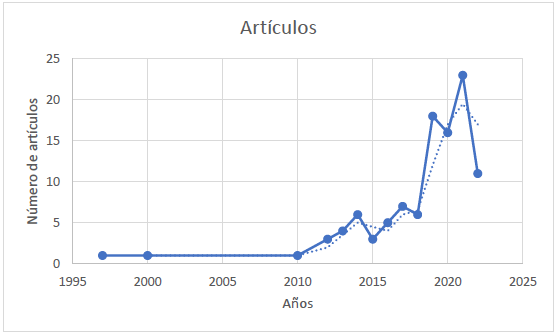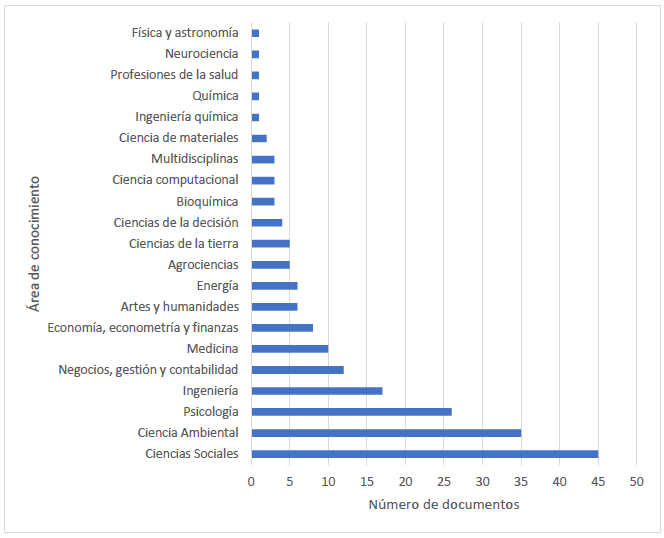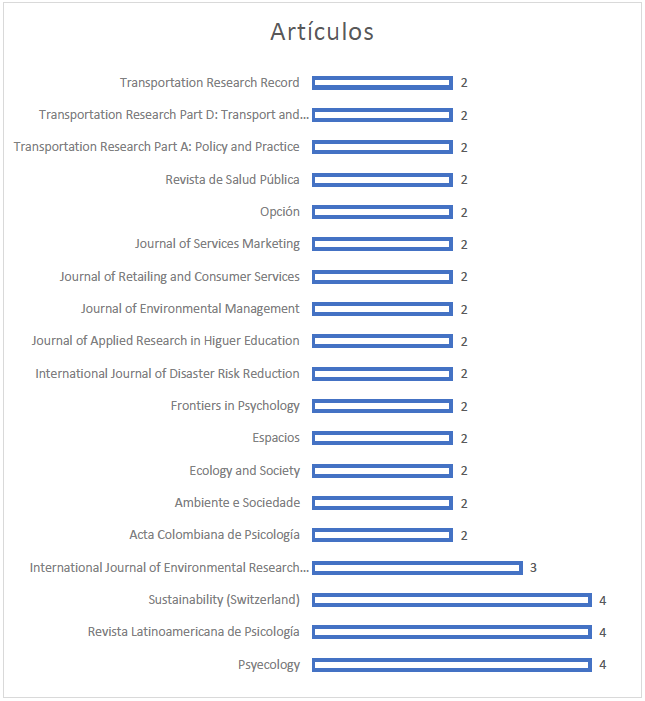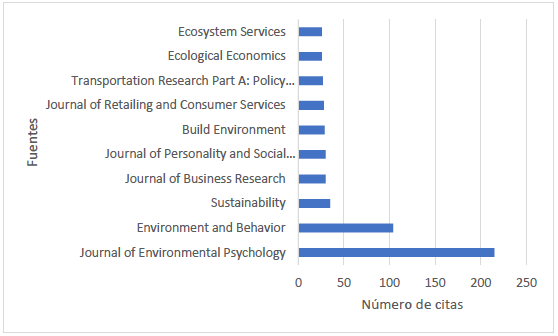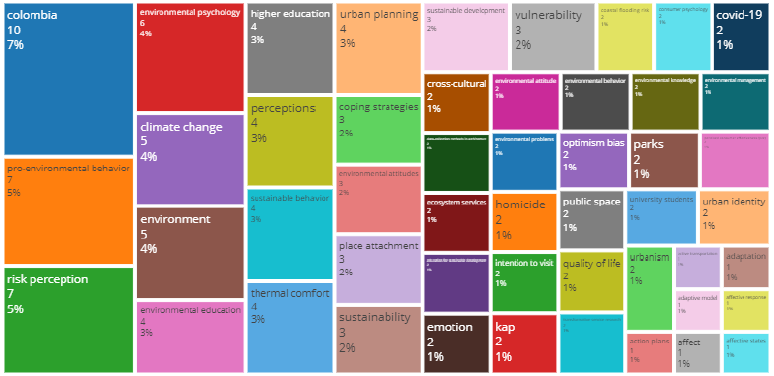Estudios de psicología ambiental con muestras colombianas: una revisión bibliométrica y temática
Environmental psychology studies with colombian samples: a bibliometric and thematic review
Resumen (es)
Los estudios de revisión de la psicología ambiental en Colombia se han centrado en documentar el campo a partir de los artículos publicados en revistas de psicología por autores que se autoidentifican con el área. Sin embargo, hay pocos estudios sobre los trabajos que se publican en otras áreas de conocimiento sobre este campo. Por esto, el trabajo revisa de manera panorámica —sin distinción de áreas— la producción científica en psicología ambiental con muestras colombianas. Se analizaron un total de 105 documentos recuperados de Scopus. En los resultados se reportan la caracterización bibliométrica y los cuadrantes temáticos por relevancia (nicho: gestión ambiental y planeación urbana; motor: cambio climático, investigación en servicios transformativos, educación ambiental y sostenibilidad; emergentes/declive: confort térmico, arquitectura; básicos: actitudes y comportamiento proambiental, percepción del riesgo). Se destaca el carácter interdisciplinar de las fuentes, los temas, la productividad e impacto de los agentes, diferentes a los reportados en otras revisiones. Por otra parte, hay una baja interacción de los autores y una concentración de las citas a trabajos con liderazgo internacional. Estos hallazgos amplían la perspectiva de la psicología ambiental del país, con investigadores de otras disciplinas que contribuyen a la teoría, métodos e intervención. Se discute que la estructura del campo profesional está motivada por una agenda externalista, interdisciplinar y orientada a la intervención; por lo cual, la consolidación y el registro de esta comunidad académica requiere una mayor apertura de las instituciones formales del campo a profesionales de otras áreas y un intercambio científico dinámico e interdisciplinar.
Resumen (en)
Studies reviewing environmental psychology in Colombia have focused on documenting the field based on articles published in psychology journals by authors who self-identify with the area. However, there are few studies on the works published in other areas of knowledge about this field. For this reason, the paper reviews in a panoramic way -without distinction of areas- the scientific production in environmental psychology with Colombian samples. A total of 105 documents, retrieved through Scopus, were analyzed. The results report the bibliometric characterization and the thematic quadrants by relevance (niche: environmental management and urban planning; driving force: climate change, research in transformative services, environmental education and sustainability; emerging/declining: thermal comfort, architecture; basic: pro-environmental attitudes and behavior, risk perception). The interdisciplinary nature of the sources, topics, productivity and impact of the agents, different from those reported in other reviews, stands out. On the other hand, there is a low interaction of authors and a concentration of citations to papers with international leadership. These findings broaden the perspective of environmental psychology in the country, with researchers from other disciplines contributing to theory, methods and intervention. It is argued that the structure of the professional field is motivated by an externalist, interdisciplinary and intervention-oriented agenda, therefore, the consolidation and registration of this academic community requires a greater openness of the formal institutions of the field to professionals from other areas and a dynamic and interdisciplinary scientific exchange.
Referencias
Alfonso Gutierrez, L. S. y Prieto Patiño, L. E. (2022). Adaptación de la escala Dragones de Inacción Barreras Psicológicas (DIPB) en población colombiana. Acta Colombiana de Psicología, 25(1), 183-202. https://www.doi.org/10.14718/ACP.2022.25.1.12
Aria, M., & Cuccurullo, C. (2017). bibliometrix: An R-tool for comprehensive science mapping analysis. Journal of Informetrics, 11(4), 959-975. https://doi.org/10.1016/j.joi.2017.08.007
Arias-Arévalo, P., Martín-López, B., & Gómez-Baggethun, E. (2017). Exploring intrinsic, instrumental, and relational values for sustainable management of social-ecological systems. Ecology and Society, 22(4), 43. https://doi.org/10.5751/ES-09812-220443
Avendaño, B. L., Serrano, S., Toro, R. y Medina-Arboleda, I. F. (2018). Una perspectiva dimensional de las estrategias de análisis utilizadas en la investigación en psicología. En V. Sánchez, M. I. Barreto y B. Avendaño (Eds.), Investigación en psicología: aplicaciones e intervenciones (pp. 23-32). Universidad Católica de Colombia. https://publicaciones.ucatolica.edu.co/pdf/logos-vestigium-investigacion-en-psicologia-cato.pdf
Bronfman, N. C., Cisternas, P. C., Repetto, P. B., & Castañeda, J. V. (2019). Natural disaster preparedness in a multi-hazard environment: Characterizing the sociodemographic profile of those better (worse) prepared. PloS ONE, 14(4), e0214249. https://doi.org/10.1371/journal.pone.0214249
Campillo, L., & De la Peña, A. (7-9 de noviembre de 2012). Human Behavior as a Function of Vegetable Coverings [conference]. PLEA 2012 Proceedings. 28th International PLEA Conference on Sustainable Architecture + Urban Design. Opportunities, Limits & Needs Towards an Environmentally Responsible Architecture. Lima, Perú. http://plea-arch.org/ARCHIVE/websites/2012/files/T01-20120130-0091.pdf
Castiblanco, A. N., Rincón, D. L., Castiblanco-Moreno, S. E. y Medina-Arboleda, I. F. (2021). Investigadores en Psicología Ambiental en Colombia: características de su formación, producción e impacto científico. Producción+ Limpia, 16(2), 160-178. 10.22507/pml.v16n2a8
Clayton, S. (2021). Climate change and mental health. Current Environmental Health Reports, 8, 1-6. https://doi.org/10.1007/s40572-020-00303-3
Codina, L., Morales-Vargas, A., Rodríguez-Martínez, R. y Pérez-Montoro, M. (2020). Uso de Scopus y Web of Science para investigar y evaluar en comunicación social: análisis comparativo y caracterización. Index comunicación, 10(3), 235-261. 10.33732/ixc/10/03Usodes
Colegio Colombiano de Psicólogos (COLPSIC). (2023). Campos disciplinares y profesionales. https://www.colpsic.org.co/campos/campos-disciplinares-y-profesionales/
Corral-Verdugo, V. (2021). Psychology of climate change (Psicología del cambio climático). Psyecology, 12(2), 254-282. https://doi.org/10.1080/21711976.2021.1901188
Cudina, J. N., & Ossa, J. C. (2016). The top 100 high-impact papers in Colombian psychology: a bibliometric study from WoS and Scopus. Informação & Sociedade, 26(2), 137-154.
Dahdouh-Guebas, F., Ahimbisibwe, J., Van Moll, R., & Koedam, N. (2003). Neo-colonial science by the most industrialised upon the least developed countries in peer-reviewed publishing. Scientometrics, 56, 329-343. https://doi.org/10.1023/A:1022374703178
Díaz, M. F., Charry, A., Sellitti, S., Ruzzante, M., Enciso, K., & Burkart, S. (2020). Psychological factors influencing pro-environmental behavior in developing countries: Evidence from Colombian and Nicaraguan students. Frontiers in Psychology, 11, 580730. https://doi.org/10.3389/fpsyg.2020.580730
Elsevier. (September 21, 2023). What does "Relevance" mean in Scopus? https://service.elsevier.com/app/answers/detail/a_id/14182/supporthub/scopus/
García, A., de Barros-Souza, B., Berzin, J., Abilio-Galvão, J., Bucher-Maluschke, J. S. N. F., & López-López, W. (2019). Recent Advances in Latin American Cooperation in Behavioral Sciences: A Documentary Study. Revista Iberoamericana de Psicología y Salud, 10(1), 37-47. https://doi.org/10.23923/j.rips.2018.02.024
Gifford, R. (2014). Environmental psychology matters. Annual Review of Psychology, 65, 541-579. https://doi.org/10.1146/annurev-psych-010213-115048
Gifford, R., Lacroix, K., Anderson, E. A., Milne-Ives, M., & Sugrue, P. (2022). Climate change, food choices, and the theory of behavioral choice. Research Square. https://doi.org/10.21203/rs.3.rs-1513250/v1
Giuliani, M. V., & Scopelliti, M. (2009). Empirical research in environmental psychology: Past, present, and future. Journal of Environmental Psychology, 29(3), 375-386. https://doi.org/10.1016/j.jenvp.2008.11.008
González-Alcaide, G., Park, J., Huamaní, C., & Ramos, J. M. (2017). Dominance and leadership in research activities: Collaboration between countries of differing human development is reflected through authorship order and designation as corresponding authors in scientific publications. PloS One, 12(8), e0182513. https://doi.org/10.1371/journal.pone.0182513
Granada, H. (2002). Psicología Ambiental. Breve introducción temática. Uninorte.
Guarin-Ardila, J. A., Montero-Ariza, R., Astudillo-García, C. I., & Fernández-Niño, J. A. (2020). Homicides during the Barranquilla Carnival, Colombia: A 10 year time-series analysis. International Journal of Environmental Research and Public Health, 17(1), 35. https://doi.org/10.3390/ijerph17010035
Guallar, J., López-Robles, J. R., Abadal, E., Gamboa-Rosales, N. K., & Cobo, M. J. (2020). Revistas españolas de Documentación en Web of Science: análisis bibliométrico y evolución temática de 2015 a 2019. Profesional de la Información, 29(6), 1-27. https://doi.org/10.3145/epi.2020.nov.06
Guillard, M., Navarro, O., Cortes, S., & Fleury-Bahi, G. (2021). How do we adapt when we are faced with the effects of climate change? International Journal of Disaster Risk Reduction, 65, 102586. https://doi.org/10.1016/j.ijdrr.2021.102586
Haslam, N., Ban, L., Kaufmann, L., Loughnan, S., Peters, K., Whelan, J., & Wilson, S. (2008). What makes an article influential? Predicting impact in social and personality psychology. Scientometrics, 76, 169-185. https://doi.org/10.1007/s11192-007-1892-8
Hernández-García, J. (2012). Open Spaces in Informal Settlements in Bogotá, Expressions of Attachment and Identity. En H. Casakin & F. Bernardo (Eds.), The Role of Place Identity in the Perception, Understanding, and Design of Built Environments (pp. 92-106). Bentham Books.
Herrera-Mendoza, K. (2021). La Crisis Medioambiental: Una mirada desde la Psicología Universidad de la Costa. https://repositorio.cuc.edu.co/handle/11323/8526
Ito, M. y Páramo, P. F. (2000). Conceptualización transcultural de lugares. Revista Latinoamericana de Psicología, 32(1), 47-78.
Jonauskaite, D., Abdel-Khalek, A. M., Abu-Akel, A., Al-Rasheed, A. S., Antonietti, J. P., Ásgeirsson, Á. G., Amenyona, K., Barma, M., Barrat, D., Bogushevskaya, V., Bouayed, M., Chamseddine, A., Charernboom, T., Chkonia, E., Ciobanu, T., Corona, V., Creed, A., Dael, N., Daouk, H., … & Mohr, C. (2019). The sun is no fun without rain: Physical environments affect how we feel about yellow across 55 countries. Journal of Environmental Psychology, 66, 101350. https://doi.org/10.1016/j.jenvp.2019.101350
Mambet Doue, C., Navarro, C., Restrepo, D., Krien, N., Rommel, D., Lemee, C., Coquet, M., Mercier, D., & Fleury-Bahi, G. (2020). The social representations of climate change: comparison of two territories exposed to the coastal flooding risk. International Journal of Climate Change Strategies and Management, 12(3), 389-406. https://doi.org/10.1108/IJCCSM-11-2019-0064
Medina-Arboleda, I. F. y Páramo, P. (2014). Percepción de los habitantes de Bogotá sobre la calidad ambiental, grado de optimismo y atribución de responsabilidad sobre su deterioro. Acta Colombiana de Psicología, 17(1), 105-118. https://doi.org/10.14718/ACP.2014.17.1.11
Milfont, T. L. (2021). The differential psychology of environmental protection/exploitation (La psicología diferencial de la protección/explotación medioambiental). PsyEcology, 12(3), 398-427. https://doi.org/10.1080/21711976.2021.1954394
Millán Otero, K. L y Sierra-Barón, W. (2022). Tendencias de investigación en Psicología Ambiental. Una revisión sistemática cualitativa (2009–2020). En W. Sierra-Barón, K.L. Millán Otero y O. Navarro Carrascal (Eds.), Psicología Ambiental. Volumen II. Experiencias, diálogos y perspectivas de investigación (pp.64 - 85). Asociación Colombiana de Facultades de Psicología - ASCOFAPSI.
Montero, I., & León, O. G. (2007). A guide for naming research studies in Psychology. International Journal of Clinical and Health Psychology, 7(3), 847-862.
Moros, L., Vélez, M. A., & Corbera, E. (2019). Payments for ecosystem services and motivational crowding in Colombia's Amazon Piedmont. Ecological Economics, 156, 468-488. https://doi.org/10.1016/j.ecolecon.2017.11.032
Navarro, O. (2005). Psicología ambiental: visión crítica de una disciplina desconocida. Duazary, 2(1), 65-68.
Navarro, O., Chaves-Castaño, L., Betancur, M. I. N. y Piñeres-Sus, J. D. (2016). Percepción del riesgo y estrategias de afrontamiento en población expuesta y no expuesta al riesgo de inundación. Revista Interamericana de Psicología, 50(3), 331-346. https://doi.org/10.30849/rip/ijp.v50i3.62
Navarro, O., Restrepo-Ochoa, D., Muñoz-Duque, L. A., Zapa-Perez, K., Ameline, A., Mercier, D., & Fleury-Bahi, G. (2020). Determinants of coping strategies in two types of natural hazards: Flash floods and coastal flooding. International Journal of Disaster Risk Reduction, 46, 101514. https://doi.org/10.1016/j.ijdrr.2020.101514
Navarro, O., Sierra-Barón, W. y Millán Otero, K. L (2022). Psicología Ambiental: ¿qué es y para qué? En W. Sierra-Barón, K. L. Millán Otero y O. Navarro Carrascal (Eds.), Psicología Ambiental. Volumen I. Experiencias, diálogos y perspectivas académicas (pp. 18 - 59). Asociación Colombiana de Facultades de Psicología (ASCOFAPSI).
Ortegón-Cortázar, L., & Royo-Vela, M. (2019). Effects of the biophilic atmosphere on intention to visit: the affective states’ mediating role. Journal of Services Marketing, 33(6), 168-180. https://doi.org/10.1108/JSM-01-2018-0019
Ortiz-Ramirez, H. A., Vallejo-Borda, J. A., & Rodriguez-Valencia, A. (2021). Staying on or getting off the sidewalk? Testing the Mehrabian-Russell Model on pedestrian behavior. Transportation research part F: traffic psychology and behavior, 78, 480-494. https://doi.org/10.1016/j.trf.2021.03.007
Páramo, P. (1996). Psicología ambiental. Suma Psicológica, 3(1), 1-12.
Páramo, P. (2013). Comportamiento urbano responsable: las reglas de convivencia en el espacio público. Revista Latinoamericana de Psicología, 45(3), 473-485. 10.14349/rlp.v45i3.1488
Páramo, P., Burbano, A., Navarro, F., Viera, E., Palacios, C., Elgier, A., de Simone, P., Licona, E., Pérez, I., Ascencio, C., Ortiz, L., Muñoz, A., & Brenes, J. (2021). Coexistence in the public spaces of Latin American cities (Convivencia en los espacios públicos de las ciudades Latinoamericanas). PsyEcology, 12(2), 202-227. https://doi.org/10.1080/21711976.2021.1888608
Páramo, P., Sandoval-Escobar, M., Jakovcevic, A., Ferreiro, J., Mustaca, A., Jengich, A., Brenes, J., Ortega-Andeane., Vivas, F., Moros, O., Pasquali., C., Aparecida, M., Anicama, J., Castillo, B., Denegrí, M., & Urzúa, A. (2015). Assessment of environmental quality, degree of optimism, and the assignment of responsibility regarding the state of the environment in Latin America. Universitas Psychologica, 14(2), 605-618. https://doi.org/10.11144/Javeriana.upsy14-2.aeqd
Parra, D. C., Gomez, L. F., Sarmiento, O. L., Buchner, D., Brownson, R., Schimd, T., Gomez, V., & Lobelo, F. (2010). Perceived and objective neighborhood environment attributes and health related quality of life among the elderly in Bogota, Colombia. Social Science & Medicine, 70(7), 1070-1076. https://doi.org/10.1016/j.socscimed.2009.12.024
Patiño, J. E., Duque, J. C., Pardo-Pascual, J. E., & Ruiz, L. A. (2014). Using remote sensing to assess the relationship between crime and the urban layout. Applied Geography, 55, 48-60. https://doi.org/10.1016/j.apgeog.2014.08.016
Pérez-Almonacid, R. (2018). Límites de la integración teórica en psicología. En G. Gutiérrez (Ed.), Teorías en Psicología (pp. 24-67). Ascofapsi-Manual Moderno.
Piña, J. A. y Zaragosa, F. (2003). Psicología ambiental: ¿disciplina científica o profesional? Revista Latinoamericana de Psicología, 35(3), 329-337.
Pranckutė, R. (2021). Web of Science (WoS) and Scopus: The Titans of Bibliographic Information in Today’s Academic World. Publications, 9(1), 12. https://doi.org/10.3390/publications9010012
Puche-Navarro, R. y Ossa, J. C. (2012). Claves de la publicación psicológica en Colombia: ritmo, grupos y modalidades de producción en la práctica investigativa. Revista Colombiana de Psicología, 21(1), 79-95. https://revistas.unal.edu.co/index.php/psicologia/article/view/31033
Rodríguez, C., Coronado, M., D’Alessandro, M., & Medina, J. (2019). The importance of standardised data-collection methods in the improvement of thermal comfort assessment models for developing countries in the tropics. Sustainability, 11(15), 4180. https://doi.org/10.3390/su11154180
Rodríguez, C. M., Coronado, M. C., & Medina, J. M. (2019). Classroom-comfort-data: A method to collect comprehensive information on thermal comfort in school classrooms. MethodsX, 6, 2698-2719. https://doi.org/10.1016/j.mex.2019.11.004
Rodríguez, C. M., Coronado, M. C., & Medina, J. M. (2021). Thermal comfort in educational buildings: The Classroom-Comfort-Data method applied to schools in Bogotá, Colombia. Building and Environment, 194, 107682. https://doi.org/10.1016/j.buildenv.2021.107682
Rodriguez, C. M., Medina, J. M., & Coronado, M. C. (2019). The development of data-collection methods for thermal comfort assessment in tropical countries. IOP Conference Series: Materials Science and Engineering, 603(5), 052001. https://doi.org/10.1088/1757-899X/603/5/052001
Rodriguez, C., Medina, J., & Pinzón, A. (2019). Thermal comfort and satisfaction in the context of social housing: Case study in Bogotá, Colombia. Journal of Construction in Developing Countries, 24(1), 101–124. https://doi.org/10.21315/jcdc2019.24.1.6
Rosenbaum, M. S., Friman, M., Contreras Ramirez, G., & Otterbring, T. (2020). Therapeutic servicescapes: restorative and relational resources in service settings. Journal of Retailing and Consumer Services, 55, 102078. https://doi.org/10.1016/j.jretconser.2020.102078
Rosenbaum, M. S., Losada, M., & Contreras, G. (2016). The restorative potential of shopping malls. Journal of Retailing and Consumer Services, 31, 157-165. https://doi.org/10.1016/j.jretconser.2016.02.011
Rosenbaum, M. S., Otalora, M. L., & Ramírez, G. C. (2016). The restorative potential of shopping malls. Journal of Retailing and Consumer Services, 31, 157-165. https://doi.org/10.1016/j.jretconser.2016.02.011
Sánchez, J. y Pérez, J. (1989). ¿Psicología o psicologías? Un problema de identidad. En J. Arnau y H. Carpintero (Coords.), Historia, teoría y método (pp. 3-70). Alhambra.
Sandoval-Escobar, M., Páramo, P., Orejuela, J., González Gallo, I., Cortés, O. F., Herrera Mendoza, K., Garzón, C. y Erazo, C. (2019). Paradojas del comportamiento proambiental de los estudiantes universitarios en diferentes disciplinas académicas. Interdisciplinaria, 36(2), 165-184. http://dx.doi.org/10.16888/interd.2019.36.2.11
Saza-Quintero, A. F., Sierra-Barón, W. y Gómez-Acosta, A. (2021). Comportamiento proambiental y conocimiento ambiental en universitarios: ¿el área de conocimiento hace la diferencia? CES Psicología, 14(1), 64-84. https://doi.org/10.21615/cesp.14.1.6
Schultz, P. W., Milfont, T. L., Chance, R. C., Tronu, G., Luís, S., Ando, K., Rasool, F., Linera Roose, P., Adedayo Ogunbode, C., Castro, J., & Gouveia, V. V. (2014). Cross-cultural evidence for spatial bias in beliefs about the severity of environmental problems. Environment and Behavior, 46(3), 267-302. https://doi.org/10.1177/0013916512458579
Shapiro, E. (2014). Correcting the bias against interdisciplinary research. Elife, 3, e02576. https://doi.org/10.7554/eLife.02576
Sierra, A. & Torres, W. (2018). Recycled materials impact on thermal comfort of low-cost housing in Latin America. Case study: Bogota D.C, Colombia. En E. Ng, S. Fong, & C. Ren. (Eds). SPLEA 2018 - Smart and Healthy within the Two-Degree Limit: Proceedings of the 34th International Conference on Passive and Low Energy Architecture (pp. 482-487). PLEA 2018.
Sierra-Barón, W. (2020). Psicología ambiental en Colombia: una revisión de sus avances. Boletín Colombiano en Psicología Ambiental, 1, 14-37. https://www.researchgate.net/publication/347074618_Psicologia_Ambiental_en_Colombia_una_revision_de_sus_avancesSierra-Barón, W., Navarro, O., Amézquita Naranjo, D. K., Teres Sierra, E. D., & Narváez González, C. M. (2021). Beliefs about Climate Change and Their Relationship with Environmental Beliefs and Sustainable Behavior: A View from Rural Communities. Sustainability, 13(9), 5326. https://doi.org/10.3390/su13095326
Sierra-Barón, W. Millán Otero, K. y Navarro Carrascal, O. (Eds.). (2022a). Psicología Ambiental. Volumen I. Experiencias, diálogos y perspectivas académicas. Asociación Colombiana de Facultades de Psicología (ASCOFAPSI). https://editorial.ascofapsi.org.co/product/psicologia-ambiental-volumen-i-experiencias-dialogos-y-perspectivas-academicas/
Sierra-Barón, W. Millán Otero, K. y Navarro Carrascal, O. (Eds.). (2022b). Psicología Ambiental. Volumen II. Experiencias, diálogos y perspectivas de investigación. Asociación Colombiana de Facultades de Psicología (ASCOFAPSI). https://editorial.ascofapsi.org.co/product/psicologia-ambiental-volumen-ii-experiencias-dialogos-y-perspectivas-de-investigacion/
Sierra-Barón, W., Rincón-Perdomo, J. M, Matta Santofimio, J. D. y González, K.Y. (2022). Panorama inicial de la educación en componentes ambientales de los programas de psicología en Colombia. En W. Sierra-Barón, K. L. Millán Otero y O. Navarro Carrascal (Eds.), Psicología Ambiental. Volumen II. Experiencias, diálogos y perspectivas de investigación (pp. 382 - 409). Asociación Colombiana de Facultades de Psicología (ASCOFAPSI). https://editorial.ascofapsi.org.co/product/psicologia-ambiental-volumen-ii-experiencias-dialogos-y-perspectivas-de-investigacion/
Sorokowska, A., Sorokowski, P., Hilpert, P., Cantarero, K., Frackowiak, T., Ahmadi, K., Alghraibeh, A., Aryeetey, R., Bertoni, A., Bettache, K., Blumen, S., Błażejewska, M., Bortolini, T., Butovskaya, M., Nalon Castro, F., Cetinkaya, H., Cunha, D., David, D., David, O., .... & Pierce Jr, J. D. (2017). Preferred interpersonal distances: a global comparison. Journal of Cross-Cultural Psychology, 48(4), 577-592. https://doi.org/10.1177/0022022117698039
Steg, L. (2023). Psychology of climate change. Annual Review of Psychology, 74, 391-421. https://doi.org/10.1146/annurev-psych-032720-042905
Thelwall, M. (2015). ¿Son más citados los artículos médicos que incluyen estadísticas detalladas?. Anales de Documentación, 18(2). https://doi.org/10.6018/analesdoc.18.2.225201
Thelwall, M., Kousha, K., Stuart, E., Makita, M., Abdoli, M., Wilson, P., & Levitt, J. (2023). Do bibliometrics introduce gender, institutional or interdisciplinary biases into research evaluations? Research Policy, 52(8), 104829. https://doi.org/10.1016/j.respol.2023.104829
Torres-Hernández, T., Barreto, I., y Vásquez, J. C. R. (2015). Creencias y normas subjetivas como predictores de intención de comportamiento proambiental. Suma Psicológica, 22(2), 86-92. https://doi.org/10.1016/j.sumpsi.2015.09.003
Vallejo-Borda, J. A., Ortiz-Ramirez, H. A., Rodriguez-Valencia, A., Hurtubia, R., & de D. Ortúzar, J. (2020). Forecasting the quality of service of Bogota’s sidewalks from pedestrian perceptions: An Ordered Probit MIMIC approach. Transportation Research Record: Journal of the Transportation Research Board, 2674(1), 205-216. https://doi.org/10.1177/0361198119896782
Vallejo-Borda, J. A., Rosas-Satizábal, D., & Rodriguez-Valencia, A. (2020). Do attitudes and perceptions help to explain cycling infrastructure quality of service? Transportation research part D: transport and environment, 87, 102539. https://doi.org/10.1016/j.trd.2020.102539
Van Bavel, J. J., Cichocka, A., Capraro, V., Sjåstad, H., Nezlek, J. B., Pavlović, T., Alfano, M., Gelfand, M., Azevedo, F., Birtel, M., Cislak, A., Lockwood, P., Malcolm Ross, R., Abts, K., Agadullina, E., Benzon Aruta, J. J., Nomvula Besharati, S., Bor, A., ... & Boggio, P. (2022). National identity predicts public health support during a global pandemic. Nature communications, 13(1), 1-14. https://doi.org/10.1038/s41467-021-27668-9
Vuotto, A., Di Césare, V. y Pallotta, N. (2020). Fortalezas y debilidades de las principales bases de datos de información científica desde una perspectiva bibliométrica. Palabra Clave, 10(1), e101. https://doi.org/10.24215/18539912e101
Xie, J., Gong, K., Li, J., Ke, Q., Kang, H., Cheng, Y. (2019). A probe into 66 factors which are possibly associated with the number of citations an article received. Scientometrics, 119, 1429–1454. https://doi.org/10.1007/s11192-019-03094-z
Yuriev, A., & Sierra‐Barón, W. (2020). Exploring sustainability cross‐culturally: Employees' beliefs on green behaviors. Sustainable Development, 28(5), 1199-1207. https://doi.org/10.1002/sd.2069
Zapa-Pérez, K., Navarro, O. y Rendón-Rivera, A. (2017). Modelo de análisis de la vulnerabilidad psicosocial en la gestión del riesgo de desastres. Revista de Gestão Social e Ambiental, 11(2), 91-110. https://doi.org/10.24857/rgsa.v11i2.1309
Cómo citar
Recibido: 14 de mayo de 2023; : 7 de octubre de 2023; Aceptado: 12 de diciembre de 2023
Resumen
Los estudios de revisión de la psicología ambiental en Colombia se han centrado en documentar el campo a partir de los artículos publicados en revistas de psicología por autores que se autoidentifican con el área. Sin embargo, hay pocos estudios sobre los trabajos que se publican en otras áreas de conocimiento sobre este campo. Por esto, el trabajo revisa de manera panorámica —sin distinción de áreas— la producción científica en psicología ambiental con muestras colombianas. Se analizaron un total de 105 documentos recuperados de Scopus. En los resultados se reportan la caracterización bibliométrica y los cuadrantes temáticos por relevancia (nicho: gestión ambiental y planeación urbana; motor: cambio climático, investigación en servicios transformativos, educación ambiental y sostenibilidad; emergentes/declive: confort térmico, arquitectura; básicos: actitudes y comportamiento proambiental, percepción del riesgo). Se destaca el carácter interdisciplinar de las fuentes, los temas, la productividad e impacto de los agentes, diferentes a los reportados en otras revisiones. Por otra parte, hay una baja interacción de los autores y una concentración de las citas a trabajos con liderazgo internacional. Estos hallazgos amplían la perspectiva de la psicología ambiental del país, con investigadores de otras disciplinas que contribuyen a la teoría, métodos e intervención. Se discute que la estructura del campo profesional está motivada por una agenda externalista, interdisciplinar y orientada a la intervención; por lo cual, la consolidación y el registro de esta comunidad académica requiere una mayor apertura de las instituciones formales del campo a profesionales de otras áreas y un intercambio científico dinámico e interdisciplinar.
Palabras clave
psicología ambiental, psicología ecológica, cambio climático, bibliometría, revisión de literatura, Colombia.Abstract
Studies reviewing environmental psychology in Colombia have focused on documenting the field based on articles published in psychology journals by authors who self-identify with the area. However, there are few studies on the works published in other areas of knowledge about this field. For this reason, the paper reviews in a panoramic way -without distinction of areas- the scientific production in environmental psychology with Colombian samples. A total of 105 documents, retrieved through Scopus, were analyzed. The results report the bibliometric characterization and the thematic quadrants by relevance (niche: environmental management and urban planning; driving force: climate change, research in transformative services, environmental education and sustainability; emerging/declining: thermal comfort, architecture; basic: pro-environmental attitudes and behavior, risk perception). The interdisciplinary nature of the sources, topics, productivity and impact of the agents, different from those reported in other reviews, stands out. On the other hand, there is a low interaction of authors and a concentration of citations to papers with international leadership. These findings broaden the perspective of environmental psychology in the country, with researchers from other disciplines contributing to theory, methods and intervention. It is argued that the structure of the professional field is motivated by an externalist, interdisciplinary and intervention-oriented agenda, therefore, the consolidation and registration of this academic community requires a greater openness of the formal institutions of the field to professionals from other areas and a dynamic and interdisciplinary scientific exchange.
Keywords
environmental psychology, ecological psychology, climate change, bibliometrics, literature review, Colombia.Introducción
Las revisiones sobre la psicología ambiental (en adelante PA) en el mundo dan cuenta de la variabilidad de las temáticas, los problemas priorizados, las metodologías, las dinámicas de generación de nuevo conocimiento y la apropiación social de este campo. Al respecto, Giuliani y Scopelliti (2009) reportaron el estudio del ambiente residencial, la cognición ambiental, la observación del comportamiento en el medio ambiente, la preocupación por el valor ecológico del medio ambiente global, la preocupación por la sostenibilidad y la conservación del medio ambiente como temas principales. Por su parte, Millán-Otero y Sierra-Barón (2022) identificaron como tendencias de investigación emergentes (entre los años 2009 y 2020) el estudio del comportamiento proambiental, el comportamiento espacial y la evaluación ambiental — preocupación ambiental, valores ambientales, desarrollo sostenible, impacto ambiental y calidad de vida—, en su mayoría con orientaciones metodológicas cuantitativas o afines al empirismo analítico, y con menor frecuencia bajo orientaciones cualitativas o perspectivas interpretativas.
Al profundizar las temáticas, es claro que el movilizador de la PA son algunas problemáticas sociales contemporáneas, verbigracia los impactos y factores psicológicos de adaptación al cambio climático (Clayton, 2021; Corral Verdugo, 2021; Gifford et al., 2022; Steg, 2023), las dimensiones psicológicas de la protección-explotación del medio ambiente (Milfont, 2021) o la valoración y preparación en lugares de riesgo de desastres naturales (Bronfman et al., 2019).
En Colombia, hay diferentes estudios que buscan documentar los agentes, temas e interacciones científicas de la PA. Estas investigaciones muestran una consolidación reciente de la PA —de las últimas tres décadas—, y caracterizan al campo como fragmentado, disperso y poco especializado (Castiblanco et al., 2021; Sierra-Barón, 2020). Al respecto, Sierra-Barón (2020) recuperó algunas figuras representativas e instituciones centrales en los orígenes y la consolidación de la PA en el país. En cuanto a individuos, se destacan Marcel Zimmerman, Henry Granada, Pablo Páramo, Oscar Navarro Carrascal y Willian Sierra-Barón; e instituciones, como el Colegio Colombiano de Psicólogos, por el campo profesional de psicología ambiental y sostenibilidad; la Asociación Colombiana de Facultades de Psicología (ASCOFAPSI), por el nodo de investigación en PA; y la Universidad Surcolombiana, por el programa de Maestría en Psicología Ambiental.
Posteriormente, Castiblanco et al. (2021) encontraron que la investigación en PA es un área secundaria de indagación de los investigadores. Salvo algunas excepciones, los investigadores comparten el trabajo en el área de la PA con actividades académicas en otras especialidades. A su vez, el grueso de los investigadores en PA no cuenta con formación posgradual, doctorados, maestría o especializaciones en el campo, y las tesis de grado de los programas de los que egresaron no están alineadas con la psicología ambiental.
Derivado de estos trabajos, se ha hipotetizado que la configuración del campo profesional de la PA ha seguido una ruta de trabajo direccionada por las demandas sociales y concentrada en problemas interdisciplinarios (Pérez-Almonacid, 2018); en particular, a los asociados con el estudio de la agencia humana en la mitigación y adaptación a la emergencia ambiental, la crisis climática y el logro de los objetivos del desarrollo sostenible (Castiblanco et al., 2021; Piña y Zaragosa, 2003). Esta tendencia en la que la agenda académica PA parece estar determinada por las demandas sociales inmediatas, en particular después de los años noventa, cae en lo que se ha llamado variaciones de la disciplina, explicadas por externalidades científicas (Pérez-Almonacid, 2018).
Una revisión de la vinculación académica y de preocupaciones socioambientales muestra que, en efecto, la problemática medioambiental está a la base de las propuestas teóricas de organización del campo de la PA publicadas en el país. Por ejemplo, los artículos “Psicología ambiental” (Páramo, 1996) y “Psicología ambiental: visión crítica de una disciplina desconocida” (Navarro, 2005); los libros Psicología Ambiental. Breve introducción temática (Granada, 2002) y Crisis Medioambiental: Una mirada desde la Psicología (Herrera-Mendoza, 2021); el Boletín Colombiano de Psicología Ambiental; y los libros compilatorios del nodo de investigación en PA, Experiencias, diálogos y perspectivas académicas (Sierra-Barón et al., 2022a) y Experiencias, diálogos y perspectivas de investigación (Sierra-Barón et al., 2022b).
Sin embargo, aunque hay evidencia a favor de la influencia o determinación externalista, los estudios no son concluyentes sobre el núcleo temático característico de la PA en Colombia. Las revisiones de literatura de PA en el país, de acuerdo con Sánchez y Pérez (1989), se han caracterizado por un sesgo disciplinar o de investigadores en la elección del corpus; por tanto, se han centrado en lo que los investigadores autoidentificados con el que campo hacen. Esto, basado en que las estrategias de recuperación de los trabajos disponibles han aplicado filtros correspondientes a documentos incluidos en fuentes específicas o con restricción disciplinar a psicología, verbigracia, los trabajos clasificables en el campo de la psicología ambiental en el Congreso Colombiano de Psicología (Sierra-Barón, 2020). En el caso de los análisis centrados en los investigadores, Castiblanco et al. (2021) filtraron por dominio temático a trabajos que hubieran expresado en títulos o palabras clave el descriptor “psicología ambiental”, con más de dos ocurrencias y en investigadores incluidos en el sistema nacional de reporte de información científica. Por tanto, los dos referentes previos constituyen revisiones con un marcado sesgo disciplinar sobre el campo de la PA en el país.
Los trabajos previos —Castiblanco et al., 2021; Sierra-Barón, 2021— pueden reproducir el sesgo en contra de la investigación interdisciplinaria. Este sesgo consiste, entre otras características, en la sobrevaloración de los aportes de los estudios que circulan en una comunidad disciplinar densa (revistas, grupos de investigación, individuos, etc.) —para el caso, en Psicología—, a expensas de los trabajos desarrollados por investigadores fueras de esta. Este sesgo se acentúa en los campos de estudio interdisciplinares, en los que las publicaciones de los campos con menor tamaño reciben menor atención y valoración bibliométrica (Shapiro, 2014; Thelwall et al., 2023).
En este contexto, al configurarse la PA un campo orientado profesionalmente, y que aborda fenómenos interdisciplinarios, requiere de revisiones en las que: (a) se incluyan los hallazgos de investigaciones y aportes metodológicos a la PA publicados en revistas científicas, sin distinción de la clasificación disciplinar de estas y (b) se seleccionen los trabajos según el origen de las muestras, en este caso, colombianas.
En este contexto, la presente revisión extiende los alcances de los trabajos previos, puesto que no tiene lugar bajo restricciones disciplinares, sino que intenta documentar los ejes temáticos de investigación de la PA en los trabajos en que tal campo de acción sea mencionado (Sánchez y Pérez, 1989). El objetivo del trabajo es sintetizar la información sobre la estructura de la comunidad de investigación sobre temas de PA en Colombia, las dinámicas de la publicación científica y los núcleos de indagación disciplinares e interdisciplinares.
Método
Tipo de estudio
La investigación, de acuerdo con la recuperación de las fuentes, es un estudio teórico (Montero y León, 2007) y de revisión bibliométrica (Aria y Cuccurullo, 2017), con una estrategia dimensional de análisis de investigación descriptiva (Avendaño et al., 2018).
Documentos de estudio
Se recuperaron los documentos identificados en la base referencial Scopus en dos fases.
En la primera se usaron las expresiones “environmental psychology”, “sustainability psychology”, “ecopsicology”, “conservation psychology”, “forestal psychology”, en inglés y español, en cualquier campo de búsqueda con el operador booleano OR, con el filtro de autoría por país Colombia y con al menos un autor de afiliación de Colombia. La elección de esta base referencial obedece a que, comparada con Web of Science, Scopus tiene un número mayor de fuentes incluidas en total, también en la categoría de Ciencias Sociales (Codina et al., 2020), y a que la cantidad de documentos exclusivos de la Web of Science, es decir, que no se recuperan con Scopus, es de menos del 10 % (Pranckutė, 2021).
En la segunda fase, los autores leyeron los resúmenes y el texto completo (cuando fue necesario) para aplicar los siguientes criterios de inclusión: (a) que fueran investigaciones de carácter empírico (sin distinción de la metodología), (b) con registro de acciones humanas, (c) en idiomas inglés o español, (d) que las muestras de los estudios fueran colombianas, así fuera parcialmente. Se excluyeron trabajos teóricos, revisiones de literatura, editoriales y trabajos de simulaciones computacionales. La selección operó bajo la condición de acuerdo forzado.
Los trabajos seleccionados fueron descargados en una base de texto delimitado por comas. Para el análisis bibliométrico se usó el programa RStudio version 4.0.5 – “Feather Spray”; librería (bibliometrix), versión 3.1.4, con la interface gráfica “biblioshiny” (Aria y Cuccurullo, 2017).
Aspectos éticos
El estudio es derivado del proyecto de investigación ‒CON0000323‒, que fue revisado y aprobado por el comité de ética de la Universidad Católica de Colombia, con calificación de riesgo nulo por el tipo de análisis de fuentes secundarias; y cubierto por la licencia de uso de la base referencial Scopus ® de la institución, con programas informáticos de uso libre con propósitos no comerciales.
Resultados
Descripción de la base
La recuperación inicial de documentos estuvo conformada por 273 resultados (18 de julio de 2022). Posteriormente, tras la lectura de resúmenes y textos completos se seleccionaron 105 documentos (99 artículos, 2 capítulos de libro y 4 resúmenes de congresos), con un rango de publicación desde 1997 hasta 2022. En general, la tendencia de publicaciones se ha incrementado constantemente (1 artículo en el primer año de registro, un máximo de 23 en el 2021 y 10 en el último año de registro), con una M=3.73 artículos por año y una M= 2.05 de citas positivas por año por documento, aunque 28 documentos no han registrado ninguna cita (26.6 %) y 12 una cita (11.4 %). Se registran 889 autores diferentes, 7 trabajos firmados por un solo autor, y 9.08 coautores por documento. En la figura 1 se presenta la tendencia de número de publicaciones por año.
Figura 1.: Número y media móvil de publicaciones por año.
En la figura 2 se presenta la información de clasificación de los documentos, de acuerdo con las áreas temáticas disciplinares reportadas por Scopus. Los documentos de la base se clasificaron en 42 áreas temáticas diferentes, las cinco primeras corresponden a Ciencias Sociales (45), Ciencia Ambiental (35), Psicología (26), Ingeniería (17) y Negocios, gestión y contabilidad (12).
Figura 2.: Número de documentos por área temática registrada en Scopus.
Análisis bibliométrico
Análisis de fuentes
En cuanto a las fuentes de publicación, se registraron 79 fuentes diferentes (75 %). Las revistas que publicaron más de un trabajo son 18 y un libro, con tres revistas con cuatro trabajos publicados: Psyecology, Revista Latinoamericana de Psicología y Sustainability (Switzerland) (figura 3). El análisis por grupos temáticos muestra que las fuentes son revistas de psicología generalista, por ejemplo, Revista Latinoamericana de Psicología; revistas de psicología especializadas, por ejemplo, Psyecology; revistas interdisciplinares generalistas, por ejemplo, Espacios; fuentes interdisciplinares especializadas, por ejemplo, Ambiente e Sociedade; y revistas especializadas de otras disciplinas, por ejemplo, Journal of Services Marketing. Las revistas Opción y Espacios fueron descontinuadas del servicio referencial de Scopus en 2019 y 2020, respectivamente.
Figura 3.: Listado de revistas con dos o más trabajos publicados.
Respecto a las revistas más citadas (ver figura 4), las dos revistas con más citas recibidas —no necesariamente al mismo artículo— por parte de los documentos de la base de análisis son especializadas en psicología ambiental. Destaca la presencia de revistas interdisciplinares especializadas, como Sustainability, y revistas disciplinares especializadas que no son de psicología, como Journal of Business Research. La mayoría de las revistas más citadas no corresponde a las revistas en que más se publicaron los documentos de la base.
Figura 4.: Revistas más citadas en la base de datos.
Análisis de autores
En cuanto a los autores, en la tabla 1 se presentan los datos de los autores con más de dos documentos publicados, con filiaciones institucionales colombianas o registro de actividades en el Sistema Nacional de Ciencia, Tecnología e Innovación de Colombia. La minoría de los autores (24.2 %) ha participado en más de un artículo, con un máximo de nueve artículos. Las temáticas de los autores prolíficos permiten identificar un conjunto de nodos de interés en publicación: (a) cambio climático y percepción del riesgo; (b) conocimiento ambiental, actitudes y comportamiento proambientales; (c) evaluación de la calidad de la infraestructura, espacios públicos y sistemas/medios de transporte; y (d) ecodiseño de atmósferas de consumo y consumo responsable.
Tabla 1.: Caracterización de los autores con dos o más artículos publicados en la base.
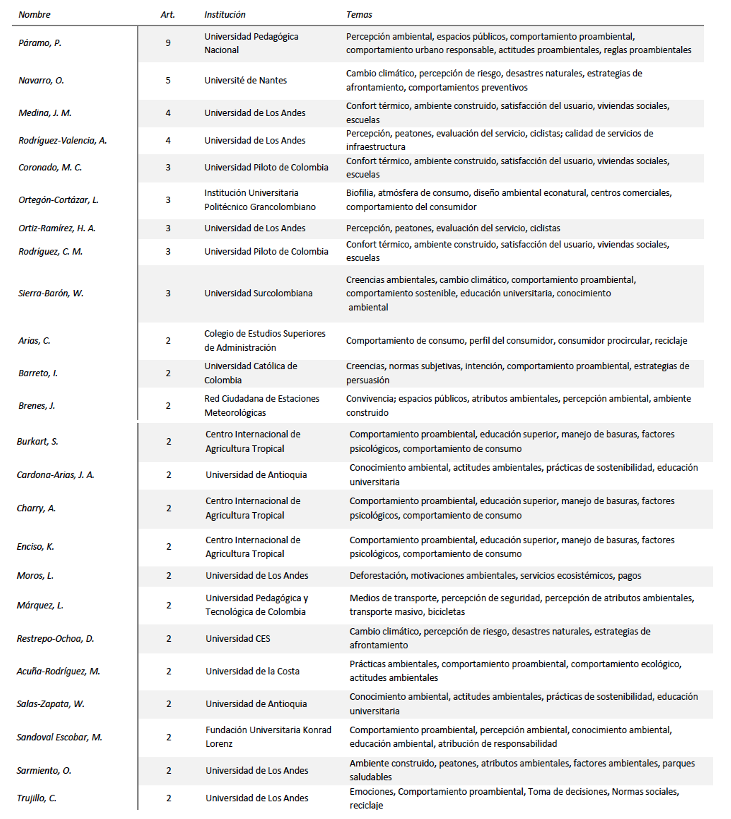
Análisis de documentos
Dado el interés en registrar las relaciones internas entre los estudios, se presenta en la tabla 2 el grupo de trabajos de la base, que a su vez tienen una o más citas por trabajos de la misma base.
Tabla 2.: Documentos con una o más citas en la base local
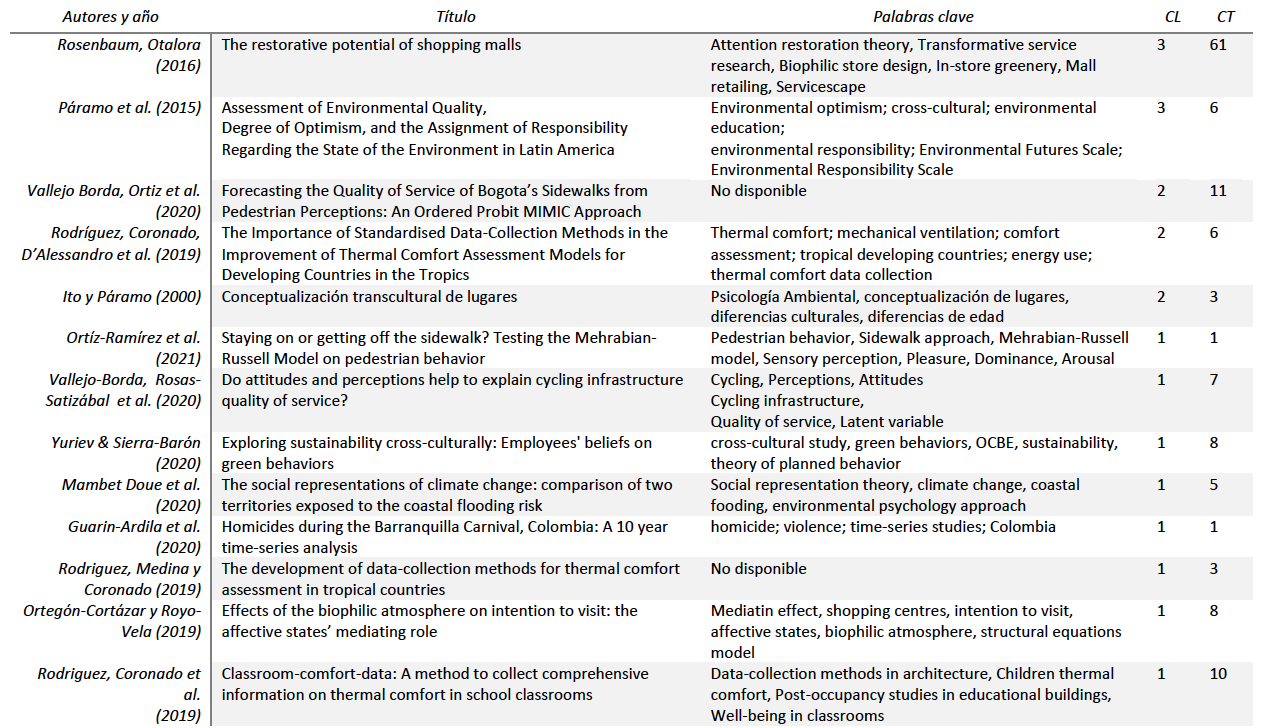
En lo que respecta a las citas a los documentos incluidos en esta base por parte de cualquier otro documento —así no esté en la base local—, los diez artículos más influyentes se presentan en la tabla 3. En general, salvo el artículo de Rosenbaum et al. (2016), no hay coincidencias en las primeras diez posiciones de las tablas. También se identifica que estos artículos provienen de investigaciones de comparación de muestras internacionales, son publicados en revistas de otras disciplinas, salvo las revistas Journal of Cross-Cultural Psychology, Environment and Behavior y Journal of Environmental Psychology; y están liderados por autores de nacionalidades y filiaciones diferentes a Colombia, con excepción de Parra et al. (2010) y Arias-Arévalo et al. (2017), quienes no están en listado de autores prolíficos.
Tabla 3.: Artículos influyentes de acuerdo con el número de citas totales recibidas.
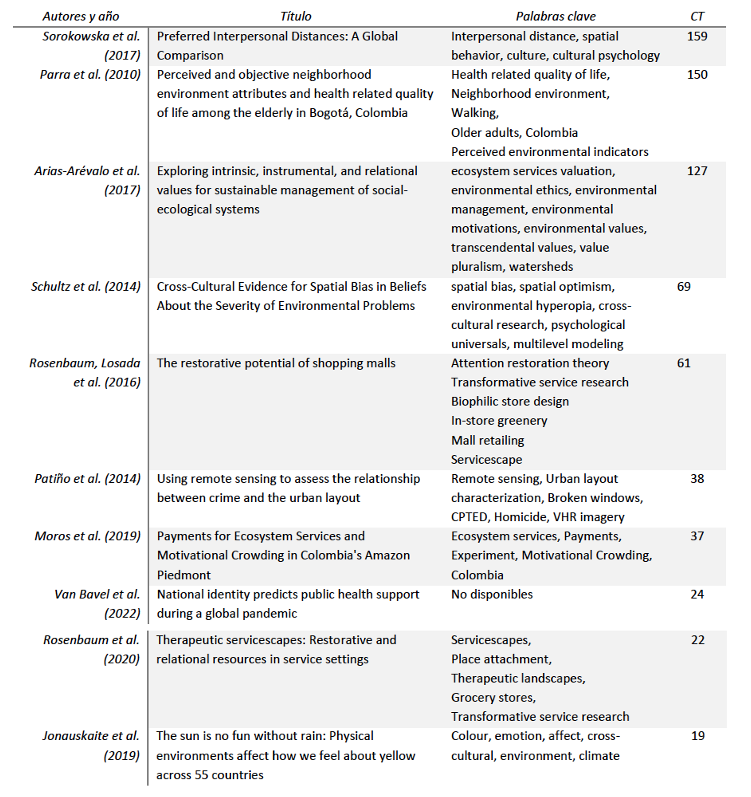
Análisis temático
Según las palabras clave usadas por los autores, en la figura 5 se identifica el mapa temático más amplio. Sobre la base de este mapa, la clasificación temática general se presenta en la tabla 4. De acuerdo con el análisis, hay 11 bloques temáticos generales, con relaciones de inclusión o solapamiento parcial. En el cuadrante superior de la izquierda (temas nicho) están los temas con un desarrollo importante en términos internos del campo, pero con un rol periférico para el desarrollo de este; en el cuadrante superior de la derecha (temas motor), los temas más estudiados e importantes para el campo; en el cuadrante inferior de la izquierda (temas emergentes o en declive), las temáticas menos estudiadas o marginales; y en el cuadrante inferior de la derecha (temas básicos), temas importantes, aunque requieran un mayor desarrollo en el estudio (Guallar et al., 2020).
Figura 5.: Árbol de palabras de la base de datos
Tabla 4.: Clasificación de temas según las palabras clave de autor
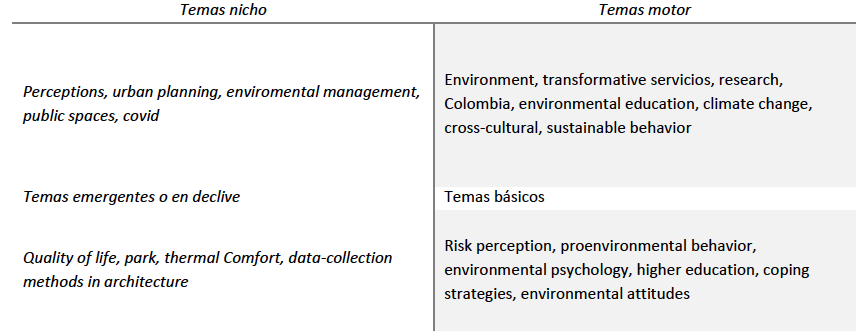
Revisión temática de los temas nicho
El cuadrante de los temas nicho está conformado por las palabras clave perceptions, urban planning, enviromental management, public spaces y covid. En la tabla 5 se presentan los datos de referencia de los cinco trabajos más relevantes del cuadrante nicho, de acuerdo con el criterio “Search engine relevance” de la base Scopus4 (Elsevier, 2023).
Tabla 5.: Documentos más relevantes en el cuadrante de temas nicho de acuerdo con Scopus.
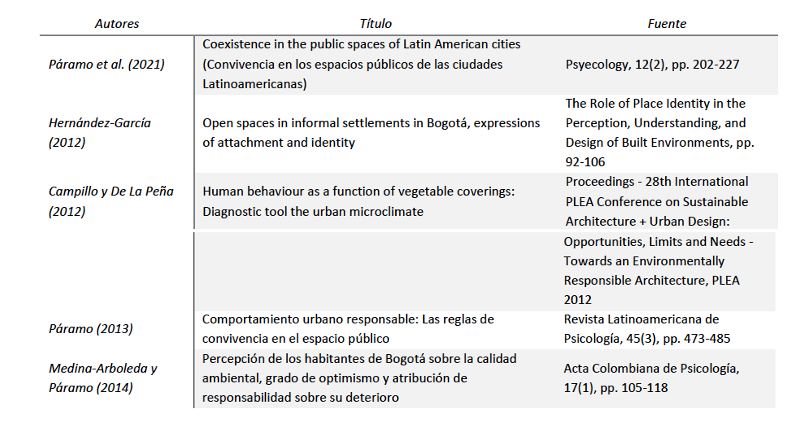
Revisión temática de los temas motor
El cuadrante de los temas motor está conformado por las palabras clave transformative service research, environmental education, climate change, cross cultural y sustainable behavior. En la tabla 6 se presentan los datos de referencia de los cinco trabajos más relevantes del cuadrante motor de acuerdo con el criterio “Search engine relevance” de la base Scopus4 (Elsevier, 2023).
Tabla 6.: Documentos más relevantes en el cuadrante de temas motor de acuerdo con Scopus.
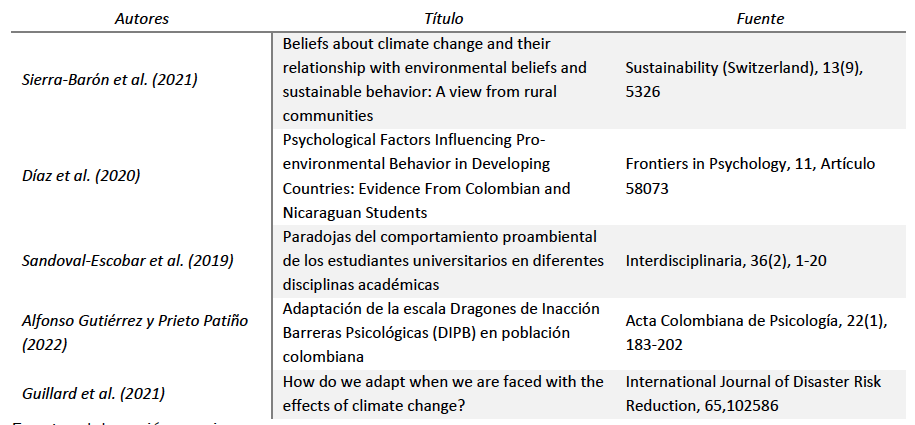
Revisión temática de los temas emergentes o en declive
El cuadrante de los temas emergentes ‒o en declive‒ está conformado por las palabras clave thermal confort y data-collection methods in arquitecture. En la tabla 7 se presentan los datos de referencia de los cinco trabajos más relevantes del cuadrante emergente ‒o en declive‒, de acuerdo con el criterio “Search engine relevance” de la base Scopus (Elsevier, 2023).
Tabla 7.: Documentos más relevantes en el cuadrante de temas emergentes o en declive de acuerdo con Scopus.
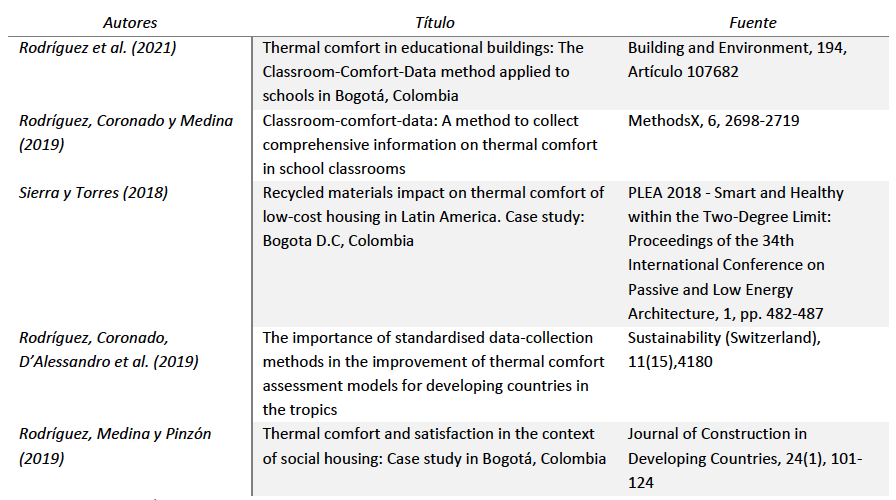
Revisión temática de los temas básicos
El cuadrante de los temas básicos está conformado por las palabras risk perception, pro- environmental behavior, higher education, coping strategies y environmental attitudes. En la tabla 8 se presentan los datos de referencia de los cinco trabajos más relevantes del nicho temas básicos, de acuerdo con el criterio “Search engine relevance” de la base Scopus (Elsevier, 2023).
Tabla 8.: Documentos más relevantes en el cuadrante de temas básicos de acuerdo con Scopus.
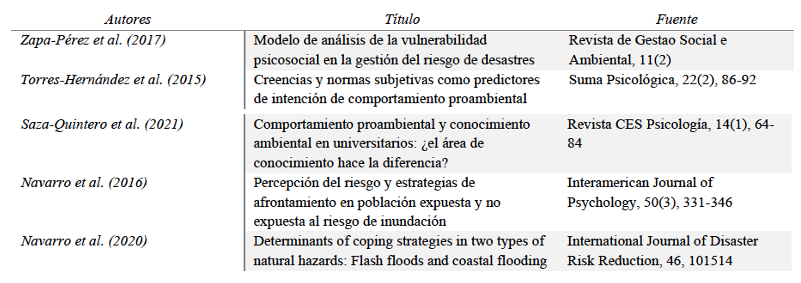
Discusión
El propósito de este estudio fue identificar y caracterizar las publicaciones con muestras colombianas que reconocieran el aporte de la psicología ambiental, sin distinción de la clasificación disciplinar de las revistas o la adscripción de los investigadores. Los resultados muestran que el campo de la psicología ambiental es eminentemente interdisciplinar y que se configura sobre la base de las problemáticas o áreas de intervención —el quehacer contextualizado de unos profesionales, sean o no psicólogos de formación y con el uso o no de teorías psicológicas (Pérez-Almonacid, 2018)—.
A diferencia de los trabajos de Castiblanco et al. (2021), Sierra-Barón (2020) y Millán- Otero y Sierra-Barón (2022), el alcance de la revisión documentó un mayor número de temas de interés e identificó un conjunto más amplio de agentes (revistas e individuos) de difusión, apropiación e intervención en el país en los alcances históricos de la psicología ambiental. Por esto, es viable afirmar que tales trabajos presentaron sesgos disciplinares en los que los estudios interdisciplinares tuvieron menos probabilidad de ser reseñados y valorados (Shapiro, 2014; Thelwall, 2015).
En particular, se destacan los trabajos sobre confort ambiental, diseño urbano y atmósferas de consumo. Estos temas corresponden a áreas de intervención específicas que están poco representadas en las revisiones teóricas basadas en definiciones u organizaciones paradigmáticas de la disciplina (Castiblanco et al., 2021; Gifford, 2014; Páramo, 1996).
En términos de las implicaciones inmediatas en la configuración del campo y la formación en PA o en la dimensión ambiental de los programas de formación pregradual y posgradual, hay que tomar en consideración la baja presencia de la psicología ambiental en la formación curricular en Colombia. Así, en el trabajo sobre formación pregradual sobre el tema, Sierra Barón et al. (2022) reportan que la minoría de programas del país (22 %) declaran la formación en psicología ambiental, sea a través del currículo formal o fuera de este, y que aquellos programas que lo hacen se concentran en los núcleos de conservación ambiental y sostenibilidad. En este contexto, la identificación de otras temáticas que están siendo abordadas por los investigadores permiten complementar el llamado a extender la formación en el campo de la PA, con una diversificación de los temas y las metodologías.
Además de la diversificación de las temáticas, el reconocimiento de las relaciones de la psicología con áreas de intervención conexas lleva a una reevaluación ocupacional de quien se forma en PA para incluir a la asesoría y consultoría en organizaciones públicas y privadas, coordinación y gestión de proyectos de desarrollo, así como la estructuración de políticas ambientales desde el enfoque psico-socio-ambiental (Navarro et al., 2022). Esto lleva, a su vez, a la paulatina transformación de los referentes gremiales de la PA, puesto que buena parte de los contextos y las habilidades requeridas no están cubiertas por las competencias profesionales disponibles (Colegio Colombianos de Psicólogos [COLPSIC], 2023; Sierra-Barón et al., 2022), verbigracia, el diseño de servicios transformativos o de restauración basadas en el lugar.
En lo que concierne a los agentes, el solapamiento de los autores y las revistas con las revisiones previas es parcial. Así, aunque hay algunos referentes que se repiten en productividad (por ejemplo, Pablo Páramo y Oscar Navarro, o las fuentes Revista Latinoamericana de Psicología . Psyecology), la dimensión de impacto muestra un panorama diferente en los liderazgos y fuentes, tanto respecto a los trabajos contenidos en esta base documental como en las citas recibidas por artículos no incluidos en el cuerpo documental. Sin embargo, a diferencia del trabajo de Castiblanco et al. (2021), en la revisión no se calculó el índice H local que identifique para las revistas y para los investigadores el grado de especialización con el que se dedican a la psicología ambiental. Tal análisis permitiría un acercamiento pormenorizado a la preponderancia laboral del campo.
Ahora bien, en cuanto al impacto científico, la revisión identificó un nicho de trabajos que reciben un mayor número de citas y que se caracterizan por estar escritos por autores en diferentes países, estar publicados en idioma inglés y que los datos provenientes de la muestra colombiana son compilados para análisis conjuntos con muestras de otros países (p. ej., Sorokowska et al. 2017). Este panorama del campo es congruente con los estudios generales sobre factores relacionados con el número de citas de los documentos, en particular la preeminencia del primer autor, el prestigio de la revista (Haslam et al., 2008; Xie et al., 2019); y, para el caso de Colombia, la pertenencia a redes internacionales de investigadores, lideradas por autores en los Estados Unidos y en Europa (Cudina y Ossa, 2016).
Algunos trabajos destacan la importancia del aumento de los estudios de colaboración internacional como una señal de integración a las redes de conocimiento y la cooperación entre países en Latinoamérica (García et al., 2019). Otras voces llaman a la prudencia respecto si esto corresponde a una genuina colaboración o si el aporte en tales investigaciones es fundamentalmente de contribución operativa (consecución de muestras o registro de datos), pero no en la concepción del problema de investigación, la primera autoría o el liderazgo (González- Alcaide et al., 2017), o, incluso, para el caso de los problemas ambientales, sin participar de la autoría de los reportes (Dahdouh-Guebas et al., 2003). En este contexto, un análisis a profundidad sobre la dirección de las citas y el comportamiento de la cocitación en los trabajos colaborativos versus los trabajos independientes de los autores puede resultar esclarecedor.
Ahora bien, el trabajo cuenta con limitaciones que condicionan la generalización de los resultados. En primer lugar, la del sesgo por la fuente de consulta. Los estudios sobre las opciones de recuperación de información muestran la preeminencia de las bases de datos estructuradas (p. ej. Scopus, Dimensions, WoS, etc.) para los análisis pormenorizados de estudios de agentes de la ciencia (Vuotto et al., 2020). Sin embargo, tales bases exigen unas condiciones de interoperabilidad a los documentos analizados, que buena parte de las alternativas editoriales de la región no cumplen. Además, una parte importante de los trabajos sobre el campo son publicados en revistas o libros que están por fuera de la sensibilidad de las alternativas de bases referenciales estructuradas (Puche-Navarro y Ossa, 2012) y, en el caso de Colombia, tal participación es mayoritaria en psicología ambiental (Castiblanco et al., 2021).
Dado este panorama, es importante tener presente que las conclusiones con este cuerpo de documentos no son representativas de la totalidad de las investigaciones con la expresión “psicología ambiental” de cualquier trabajo de investigación por parte de cualquier investigador (sin distinción de formación o clasificación disciplinar) o en cualquier tipo de problemática afín a la psicología ambiental con muestras colombianas. Tal investigación, que demanda una importante cantidad de recursos y estructuración manual de la información, permanece inédita en el país.
Referencias
- Alfonso Gutierrez, L. S. y Prieto Patiño, L. E. (2022). Adaptación de la escala Dragones de Inacción Barreras Psicológicas (DIPB) en población colombiana. Acta Colombiana de Psicología, 25(1), 183-202. https://www.doi.org/10.14718/ACP.2022.25.1.12 [CrossRef] 🠔
- Aria, M., & Cuccurullo, C. (2017). bibliometrix: An R-tool for comprehensive science mapping analysis. Journal of Informetrics, 11(4), 959-975. https://doi.org/10.1016/j.joi.2017.08.007 [CrossRef] 🠔
- Arias-Arévalo, P., Martín-López, B., & Gómez-Baggethun, E. (2017). Exploring intrinsic, instrumental, and relational values for sustainable management of social-ecological systems. Ecology and Society, 22(4), 43. https://doi.org/10.5751/ES-09812-220443 [CrossRef] 🠔
- Avendaño, B. L., Serrano, S., Toro, R. y Medina-Arboleda, I. F. (2018). Una perspectiva dimensional de las estrategias de análisis utilizadas en la investigación en psicología. En V. Sánchez, M. I. Barreto y B. Avendaño (Eds.), Investigación en psicología: aplicaciones e intervenciones (pp. 23-32). Universidad Católica de Colombia. https://publicaciones.ucatolica.edu.co/pdf/logos-vestigium-investigacion-en- psicologia-cato.pdf[Link] 🠔
- Campillo, L., & De la Peña, A. (7-9 de noviembre de 2012). Human Behavior as a Function of Vegetable Coverings [conference]. PLEA 2012 Proceedings. 28th International PLEA Conference on Sustainable Architecture + Urban Design. Opportunities, Limits & Needs Towards an Environmentally Responsible Architecture. Lima, Perú. http://plea-arch.org/ARCHIVE/websites/2012/files/T01-20120130-0091.pdf [Link] 🠔
- Castiblanco, A. N., Rincón, D. L., Castiblanco-Moreno, S. E. y Medina-Arboleda, I. F. (2021). Investigadores en Psicología Ambiental en Colombia: características de su formación, producción e impacto científico. Producción+ Limpia, 16(2), 160-178. 10.22507/pml.v16n2a8 [CrossRef] 🠔
- Clayton, S. (2021). Climate change and mental health. Current Environmental Health Reports, 8, 1-6. https://doi.org/10.1007/s40572-020-00303-3 [CrossRef] 🠔
- Codina, L., Morales-Vargas, A., Rodríguez-Martínez, R. y Pérez-Montoro, M. (2020). Uso de Scopus y Web of Science para investigar y evaluar en comunicación social: análisis comparativo y caracterización. Index comunicación, 10(3), 235-261. 10.33732/ixc/10/03Usodes [CrossRef] 🠔
- Corral-Verdugo, V. (2021). Psychology of climate change (Psicología del cambio climático). Psyecology, 12(2), 254-282. https://doi.org/10.1080/21711976.2021.1901188 [CrossRef] 🠔
- Cudina, J. N., & Ossa, J. C. (2016). The top 100 high-impact papers in Colombian psychology: a bibliometric study from WoS and Scopus. Informação & Sociedade, 26(2), 137-154. 🠔
- Dahdouh-Guebas, F., Ahimbisibwe, J., Van Moll, R., & Koedam, N. (2003). Neo-colonial science by the most industrialised upon the least developed countries in peer-reviewed publishing. Scientometrics, 56, 329-343. https://doi.org/10.1023/A:1022374703178 [CrossRef] 🠔
- Díaz, M. F., Charry, A., Sellitti, S., Ruzzante, M., Enciso, K., & Burkart, S. (2020). Psychological factors influencing pro-environmental behavior in developing countries: Evidence from Colombian and Nicaraguan students. Frontiers in Psychology, 11, 580730. https://doi.org/10.3389/fpsyg.2020.580730 [CrossRef] 🠔
- García, A., de Barros-Souza, B., Berzin, J., Abilio-Galvão, J., Bucher-Maluschke, J. S. N. F., & López-López, W. (2019). Recent Advances in Latin American Cooperation in Behavioral Sciences: A Documentary Study. Revista Iberoamericana de Psicología y Salud, 10(1), 37-47. https://doi.org/10.23923/j.rips.2018.02.024 [CrossRef] 🠔
- Gifford, R. (2014). Environmental psychology matters. Annual Review of Psychology, 65, 541-579. https://doi.org/10.1146/annurev-psych-010213-115048 [CrossRef] 🠔
- Gifford, R., Lacroix, K., Anderson, E. A., Milne-Ives, M., & Sugrue, P. (2022). Climate change, food choices, and the theory of behavioral choice. Research Square. https://doi.org/10.21203/rs.3.rs-1513250/v1 [CrossRef] 🠔
- Giuliani, M. V., & Scopelliti, M. (2009). Empirical research in environmental psychology: Past, present, and future. Journal of Environmental Psychology, 29(3), 375-386. https://doi.org/10.1016/j.jenvp.2008.11.008 [CrossRef] 🠔
- González-Alcaide, G., Park, J., Huamaní, C., & Ramos, J. M. (2017). Dominance and leadership in research activities: Collaboration between countries of differing human development is reflected through authorship order and designation as corresponding authors in scientific publications. PloS One, 12(8), e0182513. https://doi.org/10.1371/journal.pone.0182513 [CrossRef] 🠔
- Granada, H. (2002). Psicología Ambiental. Breve introducción temática. Uninorte. 🠔
- Guarin-Ardila, J. A., Montero-Ariza, R., Astudillo-García, C. I., & Fernández-Niño, J. A. (2020). Homicides during the Barranquilla Carnival, Colombia: A 10 year time-series analysis. International Journal of Environmental Research and Public Health, 17(1), 35. https://doi.org/10.3390/ijerph17010035 [CrossRef] 🠔
- Guallar, J., López-Robles, J. R., Abadal, E., Gamboa-Rosales, N. K., & Cobo, M. J. (2020). Revistas españolas de Documentación en Web of Science: análisis bibliométrico y evolución temática de 2015 a 2019. Profesional de la Información, 29(6), 1-27. https://doi.org/10.3145/epi.2020.nov.06 [CrossRef] 🠔
- Guillard, M., Navarro, O., Cortes, S., & Fleury-Bahi, G. (2021). How do we adapt when we are faced with the effects of climate change? International Journal of Disaster Risk Reduction, 65, 102586. https://doi.org/10.1016/j.ijdrr.2021.102586 [CrossRef] 🠔
- Haslam, N., Ban, L., Kaufmann, L., Loughnan, S., Peters, K., Whelan, J., & Wilson, S. (2008). What makes an article influential? Predicting impact in social and personality psychology. Scientometrics, 76, 169-185. https://doi.org/10.1007/s11192-007-1892-8 [CrossRef] 🠔
- Hernández-García, J. (2012). Open Spaces in Informal Settlements in Bogotá, Expressions of Attachment and Identity. En H. Casakin & F. Bernardo (Eds.), The Role of Place Identity in the Perception, Understanding, and Design of Built Environments (pp. 92-106). Bentham Books. 🠔
- Ito, M. y Páramo, P. F. (2000). Conceptualización transcultural de lugares. Revista Latinoamericana de Psicología, 32(1), 47-78. 🠔
- Jonauskaite, D., Abdel-Khalek, A. M., Abu-Akel, A., Al-Rasheed, A. S., Antonietti, J. P., Ásgeirsson, Á. G., Amenyona, K., Barma, M., Barrat, D., Bogushevskaya, V., Bouayed, M., Chamseddine, A., Charernboom, T., Chkonia, E., Ciobanu, T., Corona, V., Creed, A., Dael, N., Daouk, H., … & Mohr, C. (2019). The sun is no fun without rain: Physical environments affect how we feel about yellow across 55 countries. Journal of Environmental Psychology, 66, 101350. https://doi.org/10.1016/j.jenvp.2019.101350 [CrossRef] 🠔
- Mambet Doue, C., Navarro, C., Restrepo, D., Krien, N., Rommel, D., Lemee, C., Coquet, M., Mercier, D., & Fleury-Bahi, G. (2020). The social representations of climate change: comparison of two territories exposed to the coastal flooding risk. International Journal of Climate Change Strategies and Management, 12(3), 389-406. https://doi.org/10.1108/IJCCSM-11-2019-0064 [CrossRef] 🠔
- Medina-Arboleda, I. F. y Páramo, P. (2014). Percepción de los habitantes de Bogotá sobre la calidad ambiental, grado de optimismo y atribución de responsabilidad sobre su deterioro. Acta Colombiana de Psicología, 17(1), 105-118. https://doi.org/10.14718/ACP.2014.17.1.11 [CrossRef] 🠔
- Milfont, T. L. (2021). The differential psychology of environmental protection/exploitation (La psicología diferencial de la protección/explotación medioambiental). PsyEcology, 12(3), 398-427. https://doi.org/10.1080/21711976.2021.1954394 [CrossRef] 🠔
- Millán Otero, K. L y Sierra-Barón, W. (2022). Tendencias de investigación en Psicología Ambiental. Una revisión sistemática cualitativa (2009–2020). En W. Sierra-Barón, K.L. Millán Otero y O. Navarro Carrascal (Eds.), Psicología Ambiental. Volumen II. Experiencias, diálogos y perspectivas de investigación (pp.64 - 85). Asociación Colombiana de Facultades de Psicología - ASCOFAPSI. 🠔
- Montero, I., & León, O. G. (2007). A guide for naming research studies in Psychology. International Journal of Clinical and Health Psychology, 7(3), 847-862. 🠔
- Moros, L., Vélez, M. A., & Corbera, E. (2019). Payments for ecosystem services and motivational crowding in Colombia's Amazon Piedmont. Ecological Economics, 156, 468-488. https://doi.org/10.1016/j.ecolecon.2017.11.032 [CrossRef] 🠔
- Navarro, O. (2005). Psicología ambiental: visión crítica de una disciplina desconocida. Duazary, 2(1), 65-68. 🠔
- Navarro, O., Chaves-Castaño, L., Betancur, M. I. N. y Piñeres-Sus, J. D. (2016). Percepción del riesgo y estrategias de afrontamiento en población expuesta y no expuesta al riesgo de inundación. Revista Interamericana de Psicología, 50(3), 331-346. https://doi.org/10.30849/rip/ijp.v50i3.62 [CrossRef] 🠔
- Navarro, O., Restrepo-Ochoa, D., Muñoz-Duque, L. A., Zapa-Perez, K., Ameline, A., Mercier, D., & Fleury-Bahi, G. (2020). Determinants of coping strategies in two types of natural hazards: Flash floods and coastal flooding. International Journal of Disaster Risk Reduction, 46, 101514. https://doi.org/10.1016/j.ijdrr.2020.101514 [CrossRef] 🠔
- Navarro, O., Sierra-Barón, W. y Millán Otero, K. L (2022). Psicología Ambiental: ¿qué es y para qué? En W. Sierra-Barón, K. L. Millán Otero y O. Navarro Carrascal (Eds.), Psicología Ambiental. Volumen I. Experiencias, diálogos y perspectivas académicas (pp. 18 - 59). Asociación Colombiana de Facultades de Psicología (ASCOFAPSI). 🠔
- Ortegón-Cortázar, L., & Royo-Vela, M. (2019). Effects of the biophilic atmosphere on intention to visit: the affective states’ mediating role. Journal of Services Marketing, 33(6), 168-180. https://doi.org/10.1108/JSM-01-2018-0019 [CrossRef] 🠔
- Ortiz-Ramirez, H. A., Vallejo-Borda, J. A., & Rodriguez-Valencia, A. (2021). Staying on or getting off the sidewalk? Testing the Mehrabian-Russell Model on pedestrian behavior. Transportation research part F: traffic psychology and behavior, 78, 480-494. https://doi.org/10.1016/j.trf.2021.03.007 [CrossRef] 🠔
- Páramo, P. (1996). Psicología ambiental. Suma Psicológica, 3(1), 1-12. 🠔
- Páramo, P. (2013). Comportamiento urbano responsable: las reglas de convivencia en el espacio público. Revista Latinoamericana de Psicología, 45(3), 473-485. 10.14349/rlp.v45i3.1488 [CrossRef] 🠔
- Páramo, P., Burbano, A., Navarro, F., Viera, E., Palacios, C., Elgier, A., de Simone, P., Licona, E., Pérez, I., Ascencio, C., Ortiz, L., Muñoz, A., & Brenes, J. (2021). Coexistence in the public spaces of Latin American cities (Convivencia en los espacios públicos de las ciudades Latinoamericanas). PsyEcology, 12(2), 202-227. https://doi.org/10.1080/21711976.2021.1888608 [CrossRef] 🠔
- Páramo, P., Sandoval-Escobar, M., Jakovcevic, A., Ferreiro, J., Mustaca, A., Jengich, A., Brenes, J., Ortega- Andeane., Vivas, F., Moros, O., Pasquali., C., Aparecida, M., Anicama, J., Castillo, B., Denegrí, M., & Urzúa, A. (2015). Assessment of environmental quality, degree of optimism, and the assignment of responsibility regarding the state of the environment in Latin America. Universitas Psychologica, 14(2), 605-618. https://doi.org/10.11144/Javeriana.upsy14-2.aeqd [CrossRef] 🠔
- Parra, D. C., Gomez, L. F., Sarmiento, O. L., Buchner, D., Brownson, R., Schimd, T., Gomez, V., & Lobelo, F. (2010). Perceived and objective neighborhood environment attributes and health related quality of life among the elderly in Bogota, Colombia. Social Science & Medicine, 70(7), 1070-1076. https://doi.org/10.1016/j.socscimed.2009.12.024 [CrossRef] 🠔
- Pérez-Almonacid, R. (2018). Límites de la integración teórica en psicología. En G. Gutiérrez (Ed.), Teorías en Psicología (pp. 24-67). Ascofapsi-Manual Moderno. 🠔
- Piña, J. A. y Zaragosa, F. (2003). Psicología ambiental: ¿disciplina científica o profesional? Revista Latinoamericana de Psicología, 35(3), 329-337. 🠔
- Pranckutė, R. (2021). Web of Science (WoS) and Scopus: The Titans of Bibliographic Information in Today’s Academic World. Publications, 9(1), 12. https://doi.org/10.3390/publications9010012 [CrossRef] 🠔
- Rodríguez, C., Coronado, M., D’Alessandro, M., & Medina, J. (2019). The importance of standardised data- collection methods in the improvement of thermal comfort assessment models for developing countries in the tropics. Sustainability, 11(15), 4180. https://doi.org/10.3390/su11154180 [CrossRef] 🠔
- Rodríguez, C. M., Coronado, M. C., & Medina, J. M. (2019). Classroom-comfort-data: A method to collect comprehensive information on thermal comfort in school classrooms. MethodsX, 6, 2698-2719. https://doi.org/10.1016/j.mex.2019.11.004 [CrossRef] 🠔
- Rodríguez, C. M., Coronado, M. C., & Medina, J. M. (2021). Thermal comfort in educational buildings: The Classroom-Comfort-Data method applied to schools in Bogotá, Colombia. Building and Environment, 194, 107682. https://doi.org/10.1016/j.buildenv.2021.107682 [CrossRef] 🠔
- Rodriguez, C. M., Medina, J. M., & Coronado, M. C. (2019). The development of data-collection methods for thermal comfort assessment in tropical countries. IOP Conference Series: Materials Science and Engineering, 603(5), 052001. https://doi.org/10.1088/1757-899X/603/5/052001 [CrossRef] 🠔
- Rodriguez, C., Medina, J., & Pinzón, A. (2019). Thermal comfort and satisfaction in the context of social housing: Case study in Bogotá, Colombia. Journal of Construction in Developing Countries, 24(1), 101–124. https://doi.org/10.21315/jcdc2019.24.1.6 [CrossRef] 🠔
- Rosenbaum, M. S., Friman, M., Contreras Ramirez, G., & Otterbring, T. (2020). Therapeutic servicescapes: restorative and relational resources in service settings. Journal of Retailing and Consumer Services, 55, 102078. https://doi.org/10.1016/j.jretconser.2020.102078 [CrossRef] 🠔
- Rosenbaum, M. S., Losada, M., & Contreras, G. (2016). The restorative potential of shopping malls. Journal of Retailing and Consumer Services, 31, 157-165. https://doi.org/10.1016/j.jretconser.2016.02.011 [CrossRef] 🠔
- Rosenbaum, M. S., Otalora, M. L., & Ramírez, G. C. (2016). The restorative potential of shopping malls. Journal of Retailing and Consumer Services, 31, 157-165. https://doi.org/10.1016/j.jretconser.2016.02.011 [CrossRef] 🠔
- Sánchez, J. y Pérez, J. (1989). ¿Psicología o psicologías? Un problema de identidad. En J. Arnau y H. Carpintero (Coords.), Historia, teoría y método (pp. 3-70). Alhambra. 🠔
- Sandoval-Escobar, M., Páramo, P., Orejuela, J., González Gallo, I., Cortés, O. F., Herrera Mendoza, K., Garzón, C. y Erazo, C. (2019). Paradojas del comportamiento proambiental de los estudiantes universitarios en diferentes disciplinas académicas. Interdisciplinaria, 36(2), 165-184. http://dx.doi.org/10.16888/interd.2019.36.2.11 [CrossRef] 🠔
- Saza-Quintero, A. F., Sierra-Barón, W. y Gómez-Acosta, A. (2021). Comportamiento proambiental y conocimiento ambiental en universitarios: ¿el área de conocimiento hace la diferencia? CES Psicología, 14(1), 64-84. https://doi.org/10.21615/cesp.14.1.6 [CrossRef] 🠔
- Schultz, P. W., Milfont, T. L., Chance, R. C., Tronu, G., Luís, S., Ando, K., Rasool, F., Linera Roose, P., Adedayo Ogunbode, C., Castro, J., & Gouveia, V. V. (2014). Cross-cultural evidence for spatial bias in beliefs about the severity of environmental problems. Environment and Behavior, 46(3), 267-302. https://doi.org/10.1177/0013916512458579 [CrossRef] 🠔
- Shapiro, E. (2014). Correcting the bias against interdisciplinary research. Elife, 3, e02576. https://doi.org/10.7554/eLife.02576 [CrossRef] 🠔
- Sierra, A. & Torres, W. (2018). Recycled materials impact on thermal comfort of low-cost housing in Latin America. Case study: Bogota D.C, Colombia. En E. Ng, S. Fong, & C. Ren. (Eds). SPLEA 2018 - Smart and Healthy within the Two-Degree Limit: Proceedings of the 34th International Conference on Passive and Low Energy Architecture (pp. 482-487). PLEA 2018. 🠔
- Sierra-Barón, W., Navarro, O., Amézquita Naranjo, D. K., Teres Sierra, E. D., & Narváez González, C. M. (2021). Beliefs about Climate Change and Their Relationship with Environmental Beliefs and Sustainable Behavior: A View from Rural Communities. Sustainability, 13(9), 5326. https://doi.org/10.3390/su13095326 [CrossRef] 🠔
- Sierra-Barón, W. Millán Otero, K. y Navarro Carrascal, O. (Eds.). (2022a). Psicología Ambiental. Volumen I. Experiencias, diálogos y perspectivas académicas. Asociación Colombiana de Facultades de Psicología (ASCOFAPSI). https://editorial.ascofapsi.org.co/product/psicologia-ambiental-volumen-i-experiencias-dialogos-y-perspectivas-academicas/ [Link] 🠔
- Sierra-Barón, W. Millán Otero, K. y Navarro Carrascal, O. (Eds.). (2022b). Psicología Ambiental. Volumen II. Experiencias, diálogos y perspectivas de investigación. Asociación Colombiana de Facultades de Psicología (ASCOFAPSI). https://editorial.ascofapsi.org.co/product/psicologia-ambiental-volumen-ii-experiencias-dialogos-y-perspectivas-de-investigacion/ [Link] 🠔
- Sierra-Barón, W., Rincón-Perdomo, J. M, Matta Santofimio, J. D. y González, K.Y. (2022). Panorama inicial de la educación en componentes ambientales de los programas de psicología en Colombia. En W. Sierra- Barón, K. L. Millán Otero y O. Navarro Carrascal (Eds.), Psicología Ambiental. Volumen II. Experiencias, diálogos y perspectivas de investigación (pp. 382 - 409). Asociación Colombiana de Facultades de Psicología (ASCOFAPSI). https://editorial.ascofapsi.org.co/product/psicologia-ambiental-volumen-ii-experiencias-dialogos-y-perspectivas-de-investigacion/ [Link] 🠔
- Sorokowska, A., Sorokowski, P., Hilpert, P., Cantarero, K., Frackowiak, T., Ahmadi, K., Alghraibeh, A., Aryeetey, R., Bertoni, A., Bettache, K., Blumen, S., Błażejewska, M., Bortolini, T., Butovskaya, M., Nalon Castro, F., Cetinkaya, H., Cunha, D., David, D., David, O., & Pierce Jr, J. D. (2017). Preferred interpersonal distances: a global comparison. Journal of Cross-Cultural Psychology, 48(4), 577-592. https://doi.org/10.1177/0022022117698039 [CrossRef] 🠔
- Steg, L. (2023). Psychology of climate change. Annual Review of Psychology, 74, 391-421. https://doi.org/10.1146/annurev-psych-032720-042905 [CrossRef] 🠔
- Thelwall, M. (2015). ¿Son más citados los artículos médicos que incluyen estadísticas detalladas?. Anales de Documentación, 18(2). https://doi.org/10.6018/analesdoc.18.2.225201 [CrossRef] 🠔
- Thelwall, M., Kousha, K., Stuart, E., Makita, M., Abdoli, M., Wilson, P., & Levitt, J. (2023). Do bibliometrics introduce gender, institutional or interdisciplinary biases into research evaluations? Research Policy, 52(8), 104829. https://doi.org/10.1016/j.respol.2023.104829 [CrossRef] 🠔
- Torres-Hernández, T., Barreto, I., y Vásquez, J. C. R. (2015). Creencias y normas subjetivas como predictores de intención de comportamiento proambiental. Suma Psicológica, 22(2), 86-92. https://doi.org/10.1016/j.sumpsi.2015.09.003 [CrossRef] 🠔
- Vallejo-Borda, J. A., Ortiz-Ramirez, H. A., Rodriguez-Valencia, A., Hurtubia, R., & de D. Ortúzar, J. (2020). Forecasting the quality of service of Bogota’s sidewalks from pedestrian perceptions: An Ordered Probit MIMIC approach. Transportation Research Record: Journal of the Transportation Research Board, 2674(1), 205-216. https://doi.org/10.1177/0361198119896782 [CrossRef] 🠔
- Vallejo-Borda, J. A., Rosas-Satizábal, D., & Rodriguez-Valencia, A. (2020). Do attitudes and perceptions help to explain cycling infrastructure quality of service? Transportation research part D: transport and environment, 87, 102539. https://doi.org/10.1016/j.trd.2020.102539 [CrossRef] 🠔
- Van Bavel, J. J., Cichocka, A., Capraro, V., Sjåstad, H., Nezlek, J. B., Pavlović, T., Alfano, M., Gelfand, M., Azevedo, F., Birtel, M., Cislak, A., Lockwood, P., Malcolm Ross, R., Abts, K., Agadullina, E., Benzon Aruta, J. J., Nomvula Besharati, S., Bor, A., & Boggio, P. (2022). National identity predicts public health support during a global pandemic. Nature communications, 13(1), 1-14. https://doi.org/10.1038/s41467-021-27668-9 [CrossRef] 🠔
- Vuotto, A., Di Césare, V. y Pallotta, N. (2020). Fortalezas y debilidades de las principales bases de datos de información científica desde una perspectiva bibliométrica. Palabra Clave, 10(1), e101. https://doi.org/10.24215/18539912e101 [CrossRef] 🠔
- Xie, J., Gong, K., Li, J., Ke, Q., Kang, H., Cheng, Y. (2019). A probe into 66 factors which are possibly associated with the number of citations an article received. Scientometrics, 119, 1429–1454. https://doi.org/10.1007/s11192-019-03094-z [CrossRef] 🠔
- Yuriev, A., & Sierra‐Barón, W. (2020). Exploring sustainability cross‐culturally: Employees' beliefs on green behaviors. Sustainable Development, 28(5), 1199-1207. https://doi.org/10.1002/sd.2069 [CrossRef] 🠔
- Zapa-Pérez, K., Navarro, O. y Rendón-Rivera, A. (2017). Modelo de análisis de la vulnerabilidad psicosocial en la gestión del riesgo de desastres. Revista de Gestão Social e Ambiental, 11(2), 91-110. https://doi.org/10.24857/rgsa.v11i2.1309 [CrossRef] 🠔
Notas
Licencia

Esta obra está bajo una licencia internacional Creative Commons Atribución-NoComercial-CompartirIgual 4.0.
Si un artículo es aceptado, los autores/as conservarán sus derechos de autor y garantizarán a la revista el derecho de primera publicación de su obra, en este caso los derechos patrimoniales de publicación y reproducción, en medios impresos y digitales que permitan el acceso público a la obra, mediante la licencia Creative Commons, son del editor.
No obstante, un autor o un tercero pordrá adquirir el permiso de reproducción o adaptación siempre y cuando se de el crédito apropiado, proporcione un enlace a la licencia, e indique si se han realizado cambios
- Los autores/as conservarán sus derechos de autor y garantizarán a la revista el derecho de primera publicación de su obra, el cuál estará simultáneamente sujeto a la Creative Commons Atribución-NoComercial-CompartirIgual 4.0 Internacional (CC BY-NC-SA 4.0)
 , que permite a terceros compartir la obra siempre que se indique su autor y su primera publicación esta revista.
, que permite a terceros compartir la obra siempre que se indique su autor y su primera publicación esta revista. - Los autores/as podrán adoptar otros acuerdos de licencia no exclusiva de distribución de la versión de la obra publicada (p. ej.: depositarla en un archivo telemático institucional o publicarla en un volumen monográfico) siempre que se indique la publicación inicial en esta revista.
- Se permite y recomienda a los autores/as difundir su obra a través de Internet (p. ej.: en archivos telemáticos institucionales o en su página web) después del proceso de publicación, lo cual puede producir intercambios interesantes y aumentar las citas de la obra publicada.


